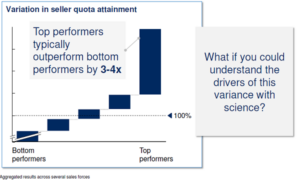Selling in the education market isn’t easy. In the education market, companies have to deal with multiple decision makers and customers that know what they want at the same time they don’t know what they want. The education market also features a long sales cycle, greater sensitivity to pricing, and an environment in which ROI is very hard to measure or demonstrate. So do you ever wonder how you can improve your “sales-team DNA” in the education marketplace?
Well, in a packed SXSWedu conference session, two accomplished McKinsey representatives, Judy Wade and Jake Bryant, provided some unique research-based insight on the matter. They announced a recent McKinsey research effort surveying forty-four growth companies (including many ed-tech firms). The research helps answer one simple question: “How can we build a powerhouse sales team in order to reach the 24 billion dollar ed-tech market?”
A recent McKinsey study performed a sales MRI on high performing ed tech sales reps.
Their research was headlined by two fearsome challenges in selling to the education market. First, they revealed that top ed-tech sales performers outperform their counterpart bottom dwellers by a factor of three-four times. Second, they seized everyone’s attention with data showing that half of a company’s ed-tech sales reps fail–and leave–their positions within three years of hiring. These alerts raise two obvious follow-up concerns, both of which were straightforwardly addressed in this presentation and specific to the ed-tech marketplace: “How can we identify and/or train a high-performance sales team?” and “What can we do to retain a high performance sales team?
Creating a high-performance ed-tech sales team
According to McKinsey, the charts below highlight the most important skills to hire, recruit and train for when strengthening your “SalesDNA.”
How do these characteristics of top performers in ed-tech sales jive with your preconceptions?
The bottom line is that firms need to pursue “traditional tenacious sales skills”, recruiting or coaching for increased trust-building skills, detail and achievement orientation, and target-setting competency. What was surprising was that the “empathetic” [to education] sales rep was inversely correlated with high levels of success.
Notice the disconnect in what firms look for and recruit in high-performing ed tech sales staff and what really matters.
Retaining a high-performance ed-tech sales team
The McKinsey research validated the notion that top sales performers were chiefly motivated by high levels of compensation, not other factors. But in an alarming find, the McKinsey study revealed that ed-market sales teams tend to place less compensation at risk, offering traditional salary structures. McKinsey suggested that performance could be improved, and better candidates recruited, if more compensation were to be put at risk through bonuses, commissions, and incentives.
All of this makes great sense to me. With over 30 years as an educational purchaser/decision maker for large school districts, I have seen the most successful relationships and ongoing business dealings occur with sales folks who helped me fight through the maze, the politics, and the obstacles I faced as a school leader. These sales people were not jerks, but neither were they timid empathizers. They were aggressive, but not alarmingly so. I would simply say they were persistent, patient, and sticky. I would call it a ‘soft’, non-pestering aggression. Sales reps I perceived as less motivated, disinterested, or disorganized were no allies of mine in the long run.
In the same vein, I know compensation strategies matter on the motivational scale. My son, who works inside sales for one of the largest tech companies in the world, recently consummated the largest ed-market sale in the history of his software company. His rewards were immediate and sizeable. He remains the top performer, loyal, and motivated. –Len Scrogan

